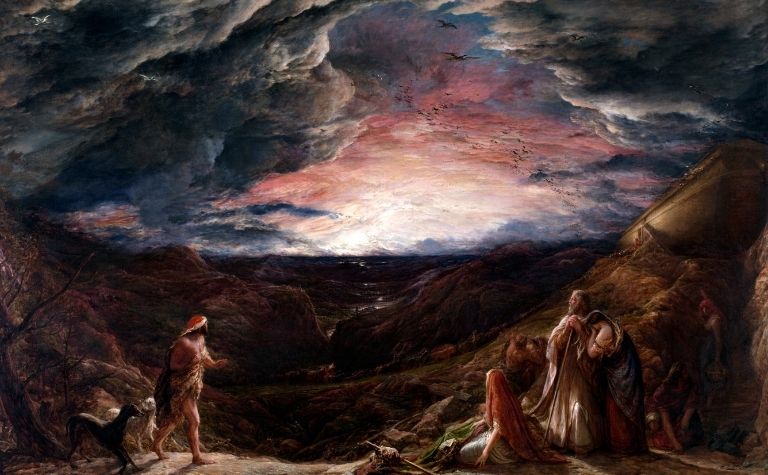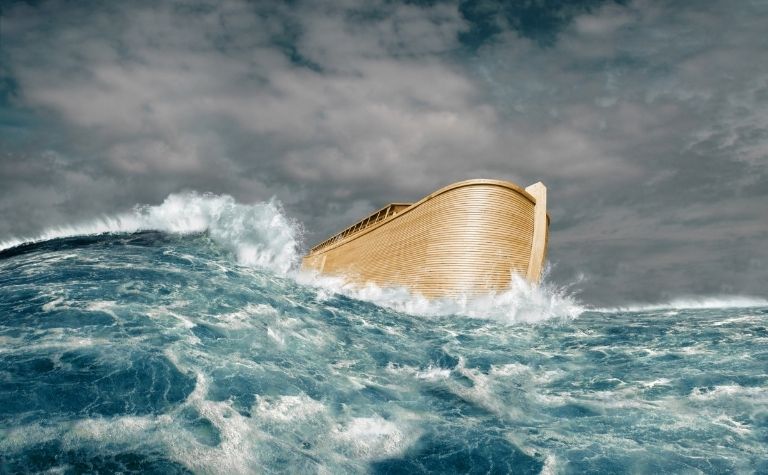After the floodwaters dissipated and the ark came to rest in the mountains of Ararat, some readers may have expected Noah and his family to live happily ever after with the animals. Sadly, this isn’t the case. Sin still existed in the world after the flood, as the first story that Genesis tells after it illustrates (9:18-29). As a result, many Bible readers want to know what Ham did to Noah that solicited a curse.
Many Genesis scholars believe that Ham’s sin was seeing Noah’s naked body, as they adopt a straightforward interpretation of the text. Others believe the passage includes a veiled description of sodomy. Another view is that Ham castrated his father. Yet another is that he had sex with his mother.
Why was it sinful for Ham to see Noah’s naked body? How do Shem and Japheth’s actions help interpret the story? What is the argument for thinking that Ham had sex with his father or mother? What is the basis for the castration view? Keep reading to learn the answers to these questions and others.
Also see Why Did Noah Curse Canaan? to learn more.

Why was it sinful for Ham to see Noah’s naked body?
According to Genesis, after the flood, Noah planted a vineyard. Then, one day he drank too much wine and lay in his tent unclothed: “Noah began to be a man of the soil, and he planted a vineyard. He drank of the wine and became drunk and lay uncovered in his tent” (Gen. 9:20-21, ESV). What happened next is the subject of debate among scholars and readers of Genesis.
What did Ham see and do? Though the Bible condemns drunkenness (e.g. Prov. 23:20), this passage highlights Ham’s sin and the curse that Noah declares due to it it. The text says that Ham saw Noah as he lay in the tent and then told his brothers about it: “And Ham, the father of Canaan, saw the nakedness of his father and told his two brothers outside” (Gen. 9:22).
How did Shem and Japheth react? Many scholars think what Shem and Japheth did next informs readers of what Ham had done wrong. “Then Shem and Japheth took a garment, laid it on both their shoulders, and walked backward and covered the nakedness of their father. Their faces were turned backward, and they did not see their father’s nakedness” (Gen. 9:23). Ham saw Noah’s nakedness; his brothers didn’t.
What was Noah’s reaction? When Noah woke up, he realized what Ham did. “Noah awoke from his wine and knew what his youngest son had done to him” (Gen. 9:24). The text doesn’t say what Noah realized or how, but he knew Ham was guilty and Shem and Japheth weren’t. So, he probably learned what happened from talking to Shem or Japheth.
Genesis scholars who read more into the story than Ham simply seeing his father’s nakedness rely on interpreting the description that Ham “saw” his father (v. 22) as a euphemism for a sexual (e.g. incest) or violent (e.g. castration) act. They also find significance in Noah knowing what his youngest son “had done” (v. 24), though the Hebrew term doesn’t specifically suggest a sexual or violent act.
Does a straightforward interpretation make the most sense of Shem and Japheth’s actions? A Genesis scholar who employs a straightforward interpretation of the scene writes, “We are on much safer ground in limiting Ham’s transgression simply to observing the exposure of the genitalia and failing to cover his naked father. Otherwise, the other two brothers’ act of covering their father’s nakedness becomes incomprehensible.” [1]
Why was it sinful for Ham to see Noah’s naked body? Genesis scholar Kenneth Mathews argues that the scene is reminiscent of Adam and Eve in the Garden of Eden. As the serpent exposed Adam and Eve’s nakedness (Gen. 3:6-13), Ham exposed Noah’s nakedness to his brothers. While God covered Adam and Eve’s nakedness (Gen. 3:21), Ham didn’t. However, Shem and Japheth did.
Mathews writes, “Whereas Adam was ‘ clothed’ by God (Gen. 3:21), Ham left his father bare. Unwilling to desert him, Shem and Japheth ‘covered the nakedness’ of Noah and carefully avoided seeing his nakedness by covering themselves (so as to blind their peripheral vision) and by walking backward (v. 23).” [2] Ham dishonored Noah, violating the sixth commandment (Exod. 20:12).
What is the basis for thinking that Ham had sex with Noah or his mother? See below.
Also see Which Son of Noah Did Jesus Come From? to learn more.

Did Ham have sex with his father?
The view that Ham had sex with his father comes from interpreting “saw” (Gen. 9:22) as a euphemism and inferring that the phrase “had done” (9:24) refers to sodomy. Some who hold this view contend that at one time, the passage contained more explicit detail, but people edited it out at a later date.
One Genesis scholar writes, “It is unwarranted to press the verb had done (Heb. asa) to mean some physical act or abuse; asa is simply the common word for ‘do, make.’ Perhaps it refers to Ham’s talking to his brothers. May not Noah have been more provoked by his son’s mouth than by his son’s hand?” [3]
Another adds, “Concerning a homosexual desire or act, there is no indication that a sexual indiscretion occurred when Ham viewed his father or that Ham desired his father in an illicit way. Levitical language for the homosexual act is ‘to lie with a male,’ which we do not find here.” [4]
Elsewhere Genesis is straightforward when describing sexual activity (cf. Gen. 19:5, 30-35; 34:2), so there is no reason it wouldn’t be here if something occurred.
Also see What Is the Message of Noah’s Ark? to learn more.

Did Ham have sex with his mother?
Elsewhere in the Old Testament, the description of uncovering someone’s nakedness is used to describe a sexual act (e.g. Lev. 18:6-19; Ezek. 16:36-37). However, the description never describes homosexual acts, only heterosexuals.
Therefore, when Leviticus forbids Israelites from seeing their father’s nakedness (e.g. Lev. 18:7), it’s prohibiting having sex with their mother.
The basis for this view is the curse Noah declares when he wakes up. If Ham had sex with his mother, then the curse that Noah announces on Canaan is because he and his offspring are the results of an incestuous relationship.
One unanswered question for those who hold this view is why the story emphasizes how Shem and Japheth covered Noah’s unclothed body. Is that description completely unrelated to Ham’s sin? Is it a euphemism for not having sex with their mother? Any interpretation of Shem and Japheth’s actions seems unsatisfactory.
What is the basis for the castration view?
Like the view that Ham’s sin was having sex with his mother, this one uses the curse to explain the first part of the story. To be clear, nothing in the text suggests that Ham castrated his father, just like nothing suggests that he had sex with his mother. Instead, this view interprets the actions of Ham through the words that Noah says at the end of the story.
Genesis 9:25-27 reads, “[God] said, ‘Cursed be Canaan; a servant of servants shall he be to his brothers.’ He also said, ‘Blessed be the LORD, the God of Shem; and let Canaan be his servant. May God enlarge Japheth, and let him dwell in the tents of Shem, and let Canaan be his servant.”
Also see How Many Wives Did Noah Have? to learn more.
References:
[1] The Book of Genesis: Chapters 1-17 by Victor Hamilton. p. 323.
[2] Genesis 1-11:26 by Kenneth Mathews. p. 418.
[3] Hamilton. p. 323.
[4] Mathews. p. 419.
Related Questions
The flood story in Genesis highlights the righteousness of Noah and his faith in God. However, the narrative ends in a tragic scene that includes Noah's drunkenness, Ham's unrighteousness, and a...
Noah's ark still fascinates Bible readers several millennia after its voyage because of its important purpose, enormous size, and the human and animal passengers it carried. Animals are a special...
